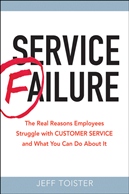Gallup finds more reasons to micromanage
 Jeff Toister
Jeff Toister  Thursday, November 19, 2009 at 8:35AM |
Thursday, November 19, 2009 at 8:35AM | A new study from the Gallup Management Journal has discovered that igorning your employees may be even more harmful than focusing on their weaknesses. Not unexpectedly, focusing on employee strengths yields the best results of all. You may know that I'm an unabashed fan of micromanaging, and this data provides more fuel for my micromanagement fire!
Micromanagement yields the best results.
I define micromanagement as actively managing employees' performance, helping them become successful, and gradually providing them with more and more autonomy as they demonstrate competency and earn trust. This definition is very consistent with a "strengths-based" management philosophy.
In Gallup's study, managers that focus on employee strengths have the most engaged employees (61%) and the fewest actively disengaged employees (1%).
Micro-meddling yields worse results.
Often confused with micromanagement, micro-meddling is a management approach that focuses on employee weaknesses. Micro-meddlers don't set clear expectations and spend their time correcting performance rather than encouraging growth. Unlike micromanagers who loosen the reins over time, micro-meddlers make it impossible for employees to earn trust and autonomy.
In Gallup's study, managers that focus on employee weaknesses engage (on average) 45% of their employees while an average of 22% of their employees are actively disengaged.
Not managing is worst of all.
The hands-off approach is even worse than micro-meddling. Gallup found that only 2% of employees who felt ignored by their managers were engaged compared to 40% who were actively disengaged. Managers who fail to provide clear and consistent direction or any feedback often choose this style because they want to avoid conflict, want to achieve a positive reputation with their employees, or are simply overwhelmed with other responsibilities. Whatever the cause, this is clearly the worst way to go.




Reader Comments